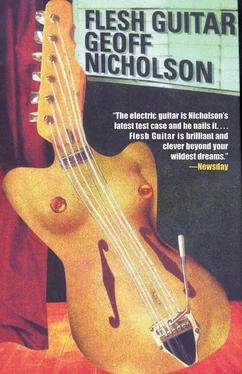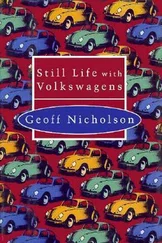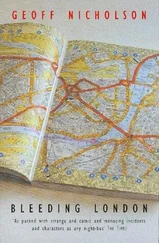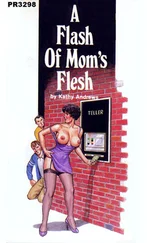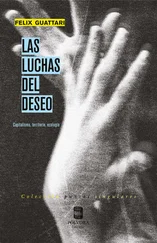‘So Tubby Moran, the quisling, got a ten-year “production” deal, and I understand he’s going to be working with some very exciting Vegas lounge acts. My lead guitarist decided to go solo and now he plays every night to completely indifferent audiences and wonders where he went wrong. And I’m left with a rhythm section that has lost its nerve. That’s how it’s going for me. How’s it going for you, Jenny?’
Jenny smiled sadly. It seemed she had no worries at all compared to Jed, but the things he’d said had started her thinking. The whole saga of Jed and Tubby and this drug called Bliss had scarcely lasted six months and yet it seemed to her that the drug, or at least something very much like it, had perhaps been around much, much longer than that. If the drug, or a precursor of the drug, had been around for a long time, then who was to say that she, along with millions of others, hadn’t already been unknowingly exposed to it.
Its existence explained so much — those albums that only had one listenable track on them, those albums you listened to once and never again, those albums you used to love and nearly wore out with playing that were now completely intolerable, those guitar solos that had once seemed so exciting and vital that now sounded so feeble and pallid.
It explained other things too. Jenny had never been able to understand how anybody could listen to Pat Metheny or John Scofield albums, but mind-altering drugs would certainly have been one way of doing it.
Then another thought struck her. That night in Phoenix when she saw Neil Young, that Free Kitten gig at the Garage in London, watching K. K. Null in Tokyo, they’d all seemed like wonderful, magnificent occasions, but how could she tell that her response had been genuine and not caused by exposure to doses of Bliss? It was a devastating idea.
The next night Jenny Slade and Jed Rhodes did a duo set at a working man’s club in Dagenham. It was not one of the great gigs. The audience was restless and halfway through the set a handful of drunks cut up nasty and started heckling and booing. Jed and Jenny smiled and lapped it up. Booing had never sounded so good.
‘Hey Kurt, where are you going with that gun in your hand?’ Jenny Slade asks brightly.
Kurt spins round. Kurt, a dishwater-blond in a lumberjack shirt, mascara’d eyes blinking at the vision. He’d thought he was alone in the room, alone with a head full of storming emotions, a suitcase full of pharmaceuticals and a few choice weapons.
‘I ain’t going nowhere,’ he says.
‘Well, that’s a blessing,’ says Jenny. ‘And how the hell are you?’
Stopping to pose, to let his words carry their full cargo, Kurt says, ‘I’ve hurt myself and I want to die.’
Jenny chuckles politely. ‘That’s my Kurt, ever the master of irony.’
We are in the apartment above the garage of Kurt and Courtney’s Madrona home, up in the eaves in a long thin room, triangular in section, one wall mostly glass. The place is a mess. Jenny wonders why he doesn’t employ a house cleaner, spread some of that money around, create a little trickle down.
The books and the CDs and the video tapes have all been carelessly cast aside. Who would have thought Kurt was such a big reader? Bukowski and Burroughs and Beckett and Burgess. Burgess? Anthony Burgess? Yep — he’s one of Kurt’s main men. The dog-ears and the split spines testify to Kurt’s attention. But then everything has a well-used look around here: wine stains on the rugs, a cigarette stubbed out on the scratch plate of a vintage Fender Jag. Only the weapons and drugs get treated with any respect.
Kurt’s guns include a Taurus revolver, a Baretta semiautomatic, a Colt rifle, a Remington twenty-gauge shotgun. His drugs of choice are heroin and Valium; a narcotic cuddle, oblivion with fluffy edges.
‘All this loading up on guns and drugs,’ Jenny says. ‘Tell me about it, Kurt. Do you think it’s clever? Do you think it’s funny?’
‘Well, it makes me laugh.’
He turns his back on her and shambles his way over to a desk by the window. There’s a writing pad and a few pens set out. The page is filled by a red scrawl, an earlier draft. Kurt picks up a pen, holds it poised in his left hand, then gradually changes his grip till he’s holding it not like a pen but a dagger. He slowly stabs the page a few times, making a row of deliberate, calculated gouges. Then he just sits there, blank as a sheet of listing paper, Mr Catatonia.
Jenny lets a few minutes pass before she says, ‘Hey Kurt, here I am, entertain me.’
Kurt doesn’t smile so she says, ‘What are you trying to write anyway? Another chart-topping hit? Another teenage angst-ridden smasheroo?’
‘A suicide note if you must know.’
‘Cool,’ she says, and then, having mulled the matter over, adds, ‘It’s funny the way we need rock stars to die on us every now and then, isn’t it? Like it wakes us up a little. It purifies the tribe, something like that.
‘Of course it probably wouldn’t happen if you were English. The English really don’t have that martyr tradition, not for rock stars anyway. They have a tendency, not necessarily a very attractive one, to keep on living, unless of course they’re John Lennon and they meet someone like Mark Whatsisname.’
‘Yeah, well I’m not English, OK?’
‘Fine.’
‘And I’m going to do it just as soon as I finish this damn letter.’
‘We could be here all night,’ Jenny says, but not loud enough for him to hear. ‘I don’t suppose anything I say will make any difference.’
‘Dead right.’
‘And I suppose there’s no point in asking you to think about Courtney and the kid.’
‘They’ll live through this,’ Kurt snarls.
‘Probably,’ Jenny agrees. ‘But you couldn’t exactly call it responsible parenting, could you now? It can’t be exactly what the therapist ordered.’
Kurt turns back to the page, sorry to have wasted time talking. Jenny decides to be helpful. He stares at the paper till his eyes cross and go out of focus.
‘When in doubt you could always use a quotation,’ Jenny offers.
‘Maybe,’ says Kurt, ‘but I wouldn’t want to quote from some old fart.’
‘It’s a strange thing about people who like popular music,’ Jenny says. ‘When they’re twenty-one they think the best music in the world is made by twenty-one-year olds. When they’re forty they think it’s made by forty-year olds — sometimes these are the same people they loved when they were twenty-one, but not always.
‘Of course, for people who like classical music it’s different. They think the only good music is made by dead people.’
Kurt looks at her with narcotic confusion in his eyes. This stuff is hard for him to follow.
‘What I’m saying,’ Jenny simplifies, ‘is that this is what pop music is for, surely, to provide a series of shorthand expressions that convey and describe various generalized, uncomplicated feelings.’
Kurt blinks at her in quiet surprise. Well yeah, what she says sounds true if a little fancy. Maybe she’s right. Maybe somebody’s already said all those things he wants to say.
‘How about “It’s All Over Now Baby Blue”?’ he says hopefully.
‘I don’t think so,’ Jenny replies. ‘Dylan’s too easy. And before you say it, “I Can’t Get No Satisfaction” is too easy as well. How about, “Come On, Do The Jerk”?’
‘No,’ Kurt says. ‘I was never much of a dancer.’
‘Then how about “Waiting For The Man”? But no, I can see that wouldn’t work, the man’s already been and gone. How about “Boom Boom”?’
‘Hey, are you taking me for a fool?’
Читать дальше
